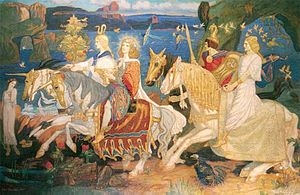Gaelic Festival of Lughnasadh

The name of the month of August in all three Gaelic languages is derived from the Celtic god Lugh (also known as Lug and in Modern Irish: Lú). In Modern Irish August is called Lúnasa, in Scottish Gaelic: Lùnastal, and in Manx: Luanistyn. At the beginning of the month Lughnasadh is celebrated. It is one of the four Gaelic seasonal festivals, along with Samhain, Imbolc and Beltane. The festival of Lughnasadh, Lughnasa or Lúnasa, like August is named after the god Lugh. Traditionally held on the first day of August it was widely observed throughout Ireland (Éire), Scotland (Alba) and the Isle of Man (Mannin). Clearly Lughnasadh was regarded as an important pre-Christian festival and is mentioned in some of the earliest Irish literature.
Lugh is one of the most prominent gods in Irish mythology. He has been described as god of arts, warriors, and sovereignty. Some have suggested a link to him being a type of sun god. Although he is associated with solar-like symbolism, there is no evidence of him being worshipped as a solar deity. In mythology he is associated with the Celtic pre-Christian gods the Tuatha Dé Danann. However, Lugh is also said to be part Fomorian, another supernatural race in Irish mythology and said to be malevolent opponents of the Tuatha Dé Danann. He features and is named in a number of cycles and traditions in Irish mythology which give various accounts of his life and deeds. In the Ulster Cycle he is said to be the father of the legendary warrior and hero Cúchulainn.
Image: Tuatha Dé Danann as depicted in John Duncan's Riders of the Sidhe (1911)






